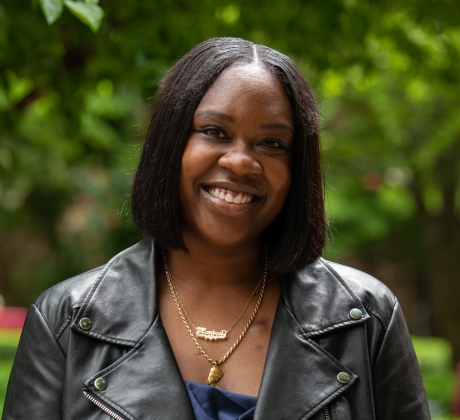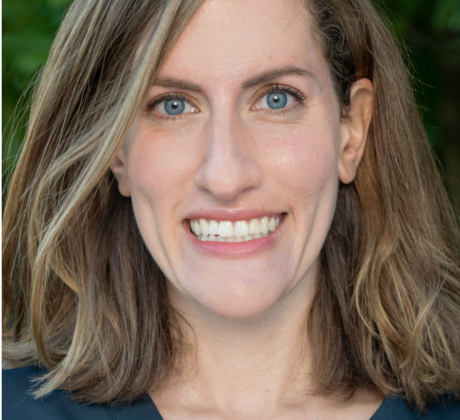Stephanie Ostroff is a speech-language pathologist and journalist. She enjoys blending knowledge from both fields to shine a light on innovators and changemakers in health care.


Marquis Vaughn, MHCI, tackled cancer and health care inequities in tandem.
When the surgical oncologist delivered the test results, she didn’t mince words.
“Your MRI lit up like a Christmas tree,” the doctor told Marquis Vaughn, MHCI ‘22. Seated alone in the exam room due to COVID-19 protocols, Vaughn absorbed the news.
It was May 2020. Vaughn, a Community Outreach Director at the Scheie Eye Institute, was no stranger to the health care system. In her role, she helped recruit more than 10,000 Black Philadelphians for one of the largest genetic studies of glaucoma, a disease that disproportionately impacts the African American community. She had also spent the past year taking courses toward Penn’s Graduate Certificate in Health Care Innovation.
The raw announcement of a breast cancer diagnosis only deepened Vaughn’s desire to make an impact on health care. A few months later, she enrolled in the Master of Health Care Innovation (MHCI), balancing online coursework alongside chemotherapy and a career.
That was something the program really instilled in me: Innovation doesn’t necessarily have to happen in a lab.
Vaughn is a North Philadelphia native with strong family ties to Penn; her father, Martin Vaughn, ‘75, was the university’s first Black starting quarterback and a Wharton graduate. She entered the MHCI with several years of research experience under her belt, but no formal training in its practice. She credits the Ethics in Health Care Innovation and Research course with solidifying her knowledge on the subject. The course explores frameworks for evaluating the ethics of research proposals and is led by Steven Joffe, MD, MPH and Emily A. Largent, JD, PhD, RN.
“It gave me a blueprint on how to ethically approach studies and subjects,” she says.
In her outreach role for Scheie’s Primary Open-Angle African American Glaucoma Genetics study, Vaughn recruited an unprecedented number of participants through a multimedia glaucoma awareness campaign. Working under Dr. Joan O’Brien, then-chairman of the Department of Ophthalmology and Principal Investigator on the study, Vaughn managed to connect with traditionally neglected communities, flipping the script on health care research.
Transforming the Narrative
“You have to be careful when studying underserved communities, because there is a huge history of wrongdoings and atrocities,” Vaughn says. She believes transforming the narrative and rebuilding trust is critical. “There aren’t a lot of African American women in research, and I feel like it is my duty and responsibility to make sure that health care and research is being introduced into this community the right way and that they’re actually benefiting from it.”
Diversity and inclusion are buzzwords. If companies don’t have something, people are looking at them funny. But even with the standard, there’s still more work to be done. It’s more than meeting a quota. . . You have to have these types of representation in higher places.
For Vaughn, one of the most valuable takeaways from the MHCI was a focus on long-term solutions over “quick fixes.” When recruiting research participants, she emphasized the potential to contribute toward future health care advances, even if the impact wasn’t immediate. Now, as she works with data from the study to improve the diagnosis and treatment of diseases like glaucoma that disproportionately affect African Americans, Vaughn is keeping her focus on the big picture while making changes on a small scale–a philosophy she applies within her own organization.
“That was something the program really instilled in me: Innovation doesn’t necessarily have to happen in a lab,” Vaughn says. Rather, it can involve “taking a look at the systems and processes we have in place, and trying to make them better.”
MHCI Lessons: Start Small for Big Impact
She recently joined a new Diversity, Equity, and Inclusion (DEI) committee at Scheie, spearheading an anonymous employee feedback process. Rather than take on the system as a whole, Vaughn says she learned from the MHCI to start small and invest her energy where it has the most impact. That’s part of what drew her to the degree itself; she intends to make change at the management level.
“Diversity and inclusion are buzzwords. If companies don’t have something, people are looking at them funny. But even with the standard, there’s still more work to be done. It’s more than meeting a quota,” Vaughn explains. “That’s why I’m gung-ho about being a part of leadership. You have to have these types of representation in higher places.”
Two years after receiving a cancer diagnosis, Vaughn earned her Master of Health Care Innovation and celebrated her first year without treatment.
“Being in this program and then going through that health crisis has actually given me a lot of insight on health care and research in many different ways,” she says. “Simultaneously I’ve been taking nuggets from both ends of the spectrum.”
May 2023 Update: Vaughn has moved into a new role as Senior Population Health Specialist, Equity & Quality Transformation Division at Covered California.

